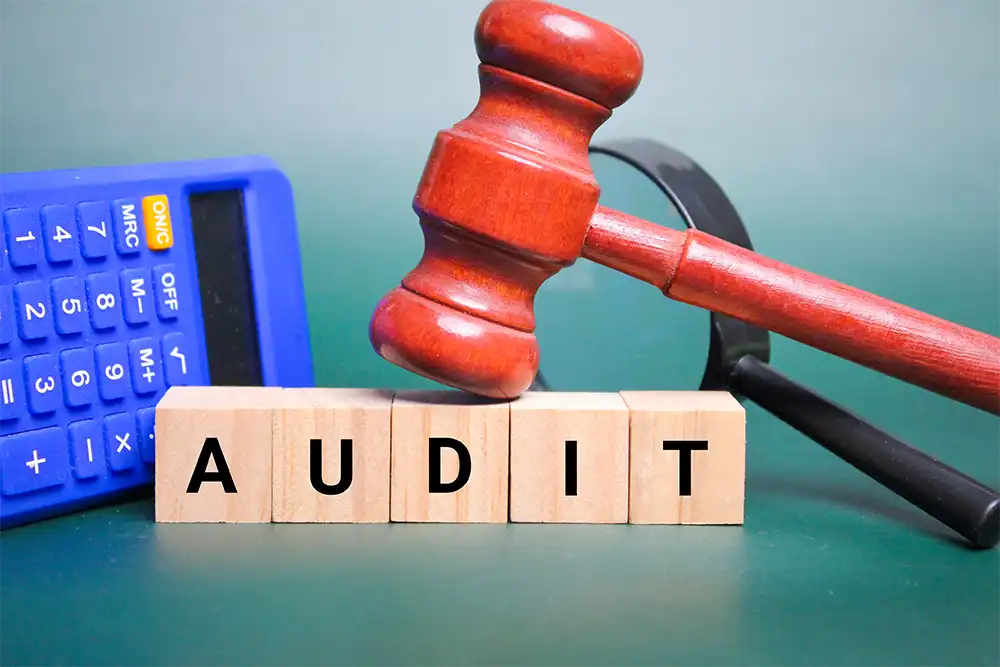Audit merupakan suatu proses di mana masalah diidentifikasi, dianalisis, dan dievaluasi melalui pemeriksaan bukti secara profesional. Namun, apakah Anda tahu perbedaan audit internal dan eksternal?
Dalam konteks bisnis, audit menjadi hal krusial untuk memastikan bahwa perusahaan beroperasi dengan baik dan mematuhi peraturan perpajakan.
Terdapat dua jenis audit yang umum dilakukan, yakni audit internal dan audit eksternal. Meskipun keduanya memiliki tujuan serupa, yaitu memastikan kesuksesan perusahaan, perbedaan signifikan muncul di antara keduanya.
Dalam artikel ini, Anda akan mengetahui perbedaan audit internal dan eksternal beserta contoh-contohnya berikut ini!
Apa itu Audit?

Audit merupakan suatu proses pemeriksaan yang dilakukan secara sistematis dan independen terhadap catatan, transaksi, prosedur, dan sistem suatu perusahaan atau organisasi
Tujuannya adalah untuk memberikan keyakinan dan pendapat yang obyektif terkait dengan kebenaran dan kewajaran informasi yang diperiksa.
Proses ini dilakukan oleh profesional yang disebut auditor, baik itu auditor internal yang merupakan bagian dari perusahaan atau organisasi itu sendiri atau auditor eksternal yang bekerja secara independen dari perusahaan atau organisasi.
Perbedaan Audit Internal dan Eksternal

Lantas, apa perbedaan audit internal dan eksternal? Anda dapat mengamati perbedaannya dari beberapa aspek, seperti asal institusi auditor, kualifikasi auditor, tujuan audit, dan lain-lain.
Aspek tersebut juga berdasar pada pernyataan perbedaan internal audit dan eksternal audit menurut Sawyer (2009).
Penjelasan yang lebih rinci mengenai perbedaan perbedaan audit internal dan eksternal adalah sebagai berikut:
1. Asal Institusi Auditor
Perbedaan audit internal dan eksternal yang pertama adalah asal insitusi auditor. Audit internal dilakukan oleh auditor yang merupakan bagian dari perusahaan sendiri.
Sementara itu, audit eksternal dilakukan oleh auditor independen yang bekerja dari luar perusahaan.
2. Kualifikasi Auditor
Auditor internal memiliki latar belakang pendidikan yang sebanding dengan karyawan perusahaan, seperti akuntansi atau manajemen.
Di sisi lain, auditor eksternal umumnya memiliki latar belakang pendidikan yang lebih spesifik, seperti akuntansi publik atau keuangan.
3. Tujuan Audit
Perbedaan audit internal dan eksternal selanjutnya ada pada tujuan dari dilaksanakannya audit itu sendiri.
Tujuan audit internal adalah membantu manajemen perusahaan dalam pemantauan dan peningkatan kinerja perusahaan.
Ini berbeda dengan audit eksternal yang bertujuan memberikan pendapat independen mengenai kebenaran dan kewajaran laporan keuangan perusahaan.
4. Ruang Lingkup Audit
Ruang lingkup audit juga merupakan salah satu aspek yang menjadi perbedaan audit internal dan eksternal.
Audit internal lebih berfokus pada pengendalian internal dan efisiensi operasional perusahaan, sedangkan audit eksternal lebih berfokus pada pengujian laporan keuangan dan pengendalian internal yang terkait dengan laporan keuangan.
5. Waktu Pelaksanaan Audit
Audit internal dilakukan secara teratur dan berkesinambungan. Namun, audit eksternal hanya dilakukan pada akhir tahun fiskal atau ketika perusahaan membutuhkan sertifikasi laporan keuangan.
6. Standar Audit
Standar audit internal diatur oleh peraturan menteri dan keputusan kepala BPKP, sementara standar audit eksternal diatur oleh Ikatan Akuntan Indonesia (IAI) dan Badan Pengawas Keuangan dan Pembangunan (BPKP).
7. Tanggung Jawab Auditor
Perbedaan audit internal dan eksternal yang terakhir adalah dari tanggung jawabnya. Tanggung jawab auditor internal adalah membantu manajemen perusahaan dalam pemantauan dan peningkatan kinerja.
Di sisi lain, tanggung jawab auditor eksternal adalah memberikan pendapat independen mengenai kebenaran dan kewajaran laporan keuangan.
Contoh Audit Internal dan Eksternal

Setelah membahas tentang point-point perbedaan audit internal dan eksternal, mari ketahui apa contoh dari keduanya.
Contoh Audit Internal
Berikut adalah contoh dari audit internal yang dapat Anda ketahui:
1. Audit Keuangan
Audit keuangan memiliki tujuan untuk mengevaluasi akurasi dan kehandalan informasi keuangan suatu perusahaan.
Dalam hal ini, tim auditor internal melakukan pemeriksaan terhadap laporan keuangan, transaksi, dan catatan keuangan guna memastikan kesesuaian dengan prinsip-prinsip akuntansi dan kebijakan perusahaan.
2. Audit Kepatuhan
Audit kepatuhan difokuskan pada pemeriksaan sejauh mana perusahaan mematuhi regulasi, hukum, kebijakan internal, dan peraturan perpajakan yang berlaku.
3. Audit Operasional
Audit operasional bertujuan untuk mengevaluasi efisiensi dan efektivitas operasional suatu perusahaan dengan meninjau proses bisnis, prosedur operasional, dan penggunaan sumber daya.
4. Audit Sumber Daya Manusia (SDM)
Audit SDM menilai praktik manajemen SDM perusahaan, mencakup evaluasi kepatuhan terhadap peraturan ketenagakerjaan, kebijakan penggajian, dan sistem evaluasi kinerja.
5. Audit Teknologi Informasi (TI)
Audit TI dilaksanakan untuk mengevaluasi keamanan dan efektivitas sistem informasi perusahaan.
Proses audit melibatkan penilaian kebijakan keamanan, pengendalian akses, dan kepatuhan terhadap standar TI.
Contoh Audit Eksternal
Selanjutnya, mari simak contoh dari audit eksternal. Pada umumnya, audit eksternal dapat dikelompokkan menjadi beberapa jenis, di antaranya adalah sebagai berikut:
1. Audit Keuangan
Audit keuangan adalah jenis audit yang paling umum. Fokus utamanya adalah memeriksa dan mengevaluasi laporan keuangan suatu organisasi.
Tujuan dari audit ini adalah untuk memastikan bahwa laporan tersebut akurat, memadai, dan sesuai dengan standar akuntansi yang berlaku.
Auditor melakukan analisis akun-akun, pemeriksaan bukti pendukung, dan tinjauan terhadap pengungkapan dalam laporan keuangan.
Hal ini dilakukan untuk memberikan keyakinan bahwa laporan keuangan mencerminkan secara wajar posisi keuangan dan hasil operasional organisasi.
2. Audit Operasional
Audit operasional bertujuan untuk mengevaluasi efisiensi, efektivitas, dan integritas dari proses operasional suatu organisasi.
Proses ini mencakup penilaian terhadap penggunaan sumber daya dan efektivitas pengendalian internal.
Nantinya, auditor akan melakukan pengecekan terhadap pemenuhan tujuan operasional serta mengidentifikasi potensi perbaikan.
Audit operasional membantu mengidentifikasi masalah dalam proses operasional yang dapat menghambat pencapaian tujuan perusahaan.
3. Audit Sistem Informasi
Audit sistem informasi dilakukan untuk mengevaluasi keamanan, efisiensi, dan efektivitas sistem informasi dan teknologi yang digunakan oleh organisasi.
Auditor memeriksa pengendalian keamanan data, memastikan kepatuhan terhadap kebijakan IT, melindungi dari ancaman siber, dan mengevaluasi penggunaan yang efektif dari sistem informasi dalam mendukung operasi perusahaan.
4. Audit Aset Perusahaan
Audit aset perusahaan berfokus pada penilaian dan verifikasi terhadap keberadaan, kondisi, dan keakuratan pencatatan aset fisik dan non-fisik suatu organisasi, seperti inventaris, properti, perlengkapan, dan hak atas kekayaan intelektual.
Tujuannya adalah memastikan bahwa aset-aset ini tercatat dengan benar dalam laporan keuangan dan berada dalam kondisi yang memadai.
Auditor melakukan verifikasi terhadap keberadaan, kondisi, dan pencatatan aset untuk menjamin integritas laporan keuangan.
Itulah dia penjelasan lengkap tentang perbedaan audit internal dan eksternal serta apa saja contoh-contohnya.
Dari uraian di atas, dapat disimpulkan bahwa audit internal dan audit eksternal memiliki perbedaan yang cukup mencolok.
Meskipun keduanya memiliki tujuan yang serupa, yaitu memastikan kesuksesan perusahaan, tetapi ruang lingkup, waktu pelaksanaan, dan tanggung jawab auditor berbeda.
Oleh karena itu, pemilihan jenis audit yang sesuai menjadi krusial bagi perusahaan untuk memastikan keberhasilannya.
Jika Anda menginkan aplikasi audit untuk membantu pekerjaan agar lebih efisien, Sekawan Media menawarkan aplikasi Audithink untuk mendukung good corporate governance!
Dengan segala fitur terlengkap, Anda dapat mengelola, menilai, dan memantau segala kinerja dan aktivitas dalam perusahaan atau organisasi Anda.
Oleh karena itu, segera kunjungi website kami atau hubungi kontak kami sekarang juga untuk informasi lebih lanjut!




